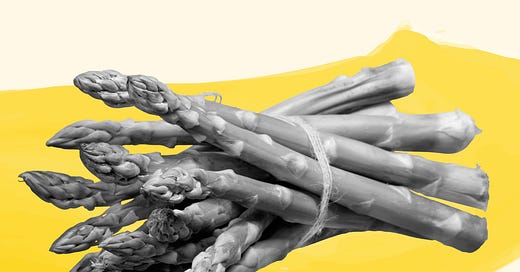Thanks to everyone who took part in The Shoulds’ first survey! I’m absolutely touched by how many of you got in touch to let me know what you loved, and would love to see more of, from the newsletter. And congratulations to reader Steph, who won the competition to receive a one-year paid subscription.
On a separate note, our second instalment of Guided Journaling with The Shoulds – a one-hour virtual journaling workshop led by yours truly – is coming up! Details at the bottom of this email.
It’s asparagus season at the moment. Until this year, I never knew how much joy it could bring.
This realisation began a couple of weeks ago, over dinner with a friend. We ordered, at her suggestion, a plateful of thick, verdant spears, cooked al dente and eaten al fresco, on a warm-ish evening – enjoyed as a side to twin massive plates of crab linguine, and quite a lot of wine. Then it was a fistful bought from a Carrefour in Nice, and sautéed in a large saucepan at our AirBnB. Recently, I’ve been eating asparagus at every opportunity: tossed in oil in the air fryer, wrapped up in a buttery Hampstead crepe, as a starter at family Friday night dinner (thanks Mum).
Before this year, asparagus barely registered on my vegetable radar – and that’s because I never paid attention to its seasonality. How, in the relatively short period between late April and mid-June, asparagus has its annual glow-up, transforming from a neglected member of the vegetable aisle to a flavoursome, versatile, joy-giving staple. Then, as soon as it begins, that magic is gone for the best part of a year.
Asparagus season comes to an end soon. I’m already anticipating the disappointment of seeing those limp, pale stems take the place of the juicy, bright in-season variety. Yet, as a fledgling asparagus lover, there’s a consolation: because now, every year, I have another thing to look forward. And really, what greater joy is there in life than looking forward to something?
It’s the same way I feel about daffodils, one of my favourite flowers, which emerge in British supermarkets in February – sometimes as early as late January – until early May. Knowing daffodil season is on the horizon, the first two months of the year – a bleak old time to be here in the UK – feel a lot brighter. Spring might not be right around the corner – but somehow these sunshine-coloured trumpets abound even in minus degree temperatures. It’s the best kind of looking forward to something, in fact, because it’s guaranteed to happen. People may come and go, places may change, but the daffodils will be in season again and somehow, in the age of everything-inflation, they’re still a quid from Tesco Express.
You know that saying about worry: that when you worry about something, it means you suffer twice? The reverse can be true, of looking forward to things. At least, in the best case scenario. First, there’s the anticipation, which generates positive feelings – excitement, hope – before anything good has even happened. This sensation was recently coined forestalgia – let’s put aside that this was by a marketing study, and not a group of psychologists – i.e. the opposite to nostalgia.
The forestalgic among us hope that the ensuing reality mirrors the expectation, at least to some degree. That achieving the professional milestone will feel as good as we think it will; that the wedding day will go mostly to plan; that seeing Taylor Swift live in concert will be worth that £206 ticket price. Thus, the forestalgia effect is compounded, the joy of anticipation blending seamlessly into the joy of actual experience.
Oftentimes, the reality is otherwise. Sometimes, the publication day is an anticlimax, the dreamboat turns out to be a footnote, or the stage is obscured by an undeclared-on-the-resale-site pillar. Such is life. But should that detract from looking forward to something? Should you feel foolish and naïve, for getting hyped up about it in the first place?
I used to think so. Every cancelled date, or holiday plan that fell apart, or night out-turned-nightmare, a voice in my head would whisper, you idiot. You shouldn’t have got so over-excited and put expectations on things. It felt childish to daydream about the near-future, the way I once spent every Maths lesson: in a heady fantasy that dwarfed any potential reality. It felt shameful. ‘I don’t want to get my hopes up,’ people often say, echoing this sentiment.
‘You like having something to look forward to,’ someone close to me once said. It was stated neutrally, factually – but it’s always stuck with me. My relationship with that statement has changed, from one of ambivalence to one of pride. Because I do like to look forward to things. And isn’t that a good thing?
That child-like anticipation doesn’t come as easily as it used to. I’m not trying to sound like a jaded 103-year-old here; it’s more the opposite. At my current life stage, I’ve exhausted most of the ‘firsts’ available to me: I’ve been to enough parties, kissed enough handsome strangers, travelled to enough new places.*
The other kinds of anticipation – of watching children grow up, or getting married, or reaching the pinnacle of my writing career, or cultivating my first vegetable garden – feel a little remote and/or abstract right now. At least, that’s how I feel in my lost moments.
Still, I like to look forward to things. And I like to create situations where that can happen. It’s why I don’t quite understand the hype around ‘spontaneous’ travel. I’m a remote-working freelancer without dependants – I could hop on a plane to nowhere tomorrow. But then why would I do that, and rid myself of the joy of anticipating it for a month or two? Will I pack for said holiday in advance? Absolutely not. But I’ll be in a much better mood in the weeks leading up to it.
Holidaymakers are significantly happier in the fortnight leading up to their holidays, compared to those not going on holiday. That’s a stat I used about a decade ago in a magazine feature, and still quote back to people regularly – as if I need science to explain myself.
*actually, I lied; I would like to be invited to some more fabulous parties, preferably in exotic locations with handsome strangers.
Forestalgia, I’ve decided, is a win-win scenario.
Events live a half-life in my head. And sometimes, if I’m disappointed by the reality, I’m still glad of that period of anticipation. Take, for instance, Greta Gerwig’s Barbie. I read that the marketing budget was $150 million – $5 million more than the film cost to make. Now, I didn’t love Barbie as much as I’d hoped. But the months I spent anticipating it, reading every bit of press there was to read and listening to ‘I’m Just Ken’ on repeat? Magical. It was the same story for the Bob Dylan biopic, A Complete Unknown: I got chills the first, and second, and maybe third time I watched the trailer. I loved looking forward to these films, and even though the reality didn’t live up to that anticipation, it was still pretty good.
Of course, it’s different when it comes to situations involving others – when there’s ego involved, and the disappointment of the plan going haywire, or not happening at all, gets intermingled with feelings of insecurity or unworthiness. I’m lucky enough to have close relationships in my life where I know the forestalgia is mutual, and that only extreme circumstances will stop us from coming together.
I’ve also learnt to avoid dynamics where plans are frequently cancelled, or it’s unclear whether they will happen or not. For some people, and at some life stages, that arrangement is perfect – but for me? My inner child got her hopes up!
Because looking forward to things is child-like, in the best way. We should treat that instinct with tenderness, rather than shame. Even if the future does look different to our fantasy, it might be just as good – just in an alternative way. The key is to hold it gently. To indulge in the fantasy, then be receptive to the reality. And if you need certainty, amid the chaos? There’s always asparagus season.
Until next week!
Francesca
Enjoyed this essay? You might enjoy my premium content (behind a paywall for the cost of an everything bagel!). Here’s a curated list of some of my most popular:
Guided Journaling with The Shoulds - Saturday 7 June - 12pm
As we reach the halfway point of the year, this virtual session will be a chance to reflect and look forward to the next six months ahead – I love running these journaling sessions, and hanging out as a community online.
To keep these workshops intimate and interactive, these are limited to paid subs. If that’s not you yet, upgrade your subscription today and receive this + all the added subscriber perks (paid written content, online events, recommendations, interviews etc!)
Keep reading with a 7-day free trial
Subscribe to The Shoulds by Francesca Specter to keep reading this post and get 7 days of free access to the full post archives.









